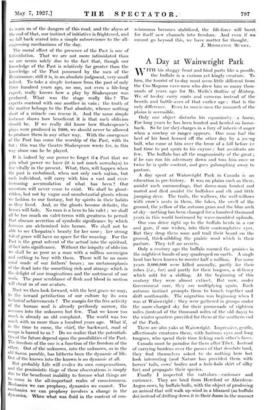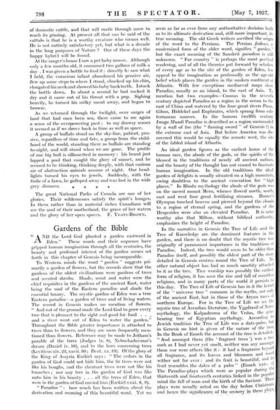A Day at Wainwright Park W ITH his sha gg y front and
hind parts like a poodle, the buffalo is a curious yet kingly creature. To him, the tourist of to-day must seem little different from the Cro-Magnon cave-men who drew him so many thou- sands of years ago for Mr. Wells's Outline of History. We of to-day carry coats and cameras instead of the beards and battle-axes of that earlier age : that is the only difference. Even to movie-men the monarch of the plains is accessible. Only one object disturbs his equanimity—a horse. For long years he has been hunted and herded on horse- back. So he (or she) charges in a fury of inherited anger when a cowboy or ranger appears. One man had the heel of his boot horned off the other day by a yomig bull, who' came at him over the brow of a hill before he had time to put spurs to his eayuse ; but accidents are few. The buffalo has all the magnanimity of the great.; if he can run his adversary down and toss him once or twice he is quite content, and goes galumphing away to pasture. A day spent at Wainwright Park in Canada is an education in pre-history. It was on plains such as these, amidst such surroundings, that dawn-man hunted and mated and died amidst the buffaloes and elk and little jumping deer. The trails, the wallows, the wolf-willows _ with crow's nests in them, the lakes, the swell of the ground, the yellow of the autumn grass and the blue arch of sky—nothing has been changed for a hundred thousand years in this world horizoned by wave-moulded uplands. One can drive right up to the buffalo herds in "a car and gaze, if one wishes, into their contemplative eyes. But they drop them soon and trail their beard on the ground, thick-nibbling the prairie wool which is their pasture. They tell no secrets. Only a century ago the buffalo roamed the prairies in the mightiest bands of any quadruped on earth. A single herd has been known to muster half a million. For some years 3,000,000 were killed annually, partly for their robes (i.e., fur) and partly for their tongues, a delicacy which sold for a shilling. At the beginning of this century they were almost extinct. But now, under Government care, they are multiplying again. Each autumn instinct prompts them to bunch together and drift southwards. The migration was beginning when I was at WainWright : they were gathered in groups under the snow-charged sky for their promenade of eighteen miles (instead of the thousand miles of the old days) to the winter quarters provided for them at the southern end of the Park. There are also yaks at Wainwright. Impressive, gentle, affectionate creatures these, with lustrous eyes and long tongues, who spend their time licking each other's faces. Canada must be paradise for them after Tibet. Instead of carrying burdens over the passes of that desolate land, they find themselves asked to do nothing here but look interesting (and Nature has provided them with horses' tails, cows' bodies and a hula-hula skirt of silky fur) and propagate their species. Finally I inspected the cattaloes—curiouser and curiouser. They are bred from Hereford or Aberdeen- Angus cows, by buffalo bulls, with the object of producing an animal that will walk up-wind in a blizzard (as buffalo do) instead of drifting down it to their doom in the manner of domestic cattle, and that will rustle through snow to reach its grazing. At present all that can be said of the cattalo is that he is a worthy creature who means well. He is not entirely satisfactory yet, but what is a decade in the long purposes of Nature ? One of these days the happy hybrid will be found.
At the ranger's house I saw a pet baby moose: Although only a few months old, it consumed two gallons of milk a day . I was given a bottle to feed it : directly 112 saw what I held, the voracious infant abandoned his pensive air, flew up some steps to where I stood, chucked up his chin, elongated his neck and showed his baby back teeth. I stuck the bottle down. In about a second he had sucked it dry and it came out of his throat with a pop. Sighing heavily, he turned his milky snout away, and began to browse.
As we returned through the twilight, over surges of .land that had once been sea, there came to me again a sense of the overpowering past : to my drowsy senses it seemed as if we drove back in time as well as space.
A group of buffalo stood on the sky-line, patient, pen- sive, regardless of time and fate, a group from the child- hood of the world, standing there as buffalo are standing to-night, and will stand when we are gone. The profile of one big bull is silhouetted in memory : his beard just lapped a pool that caught the glory of sunset, and he .seemed to be thinking, thinking deeply, with that curious air of abstraction animals assume at night. Our head- lights turned his eyes to jewels. Suddenly, with the frolic of a fawn, he galloped away and was lost in the wide grey dimness.
The great National Parks of Canada are one of her glories. Their wildernesses satisfy the spirit's hunger. In them rather than in material riches Canadians will see the soul of their motherland, the grace of her waters and the glory of her open spaces. F. YEATS-BROWN.















































 Previous page
Previous page